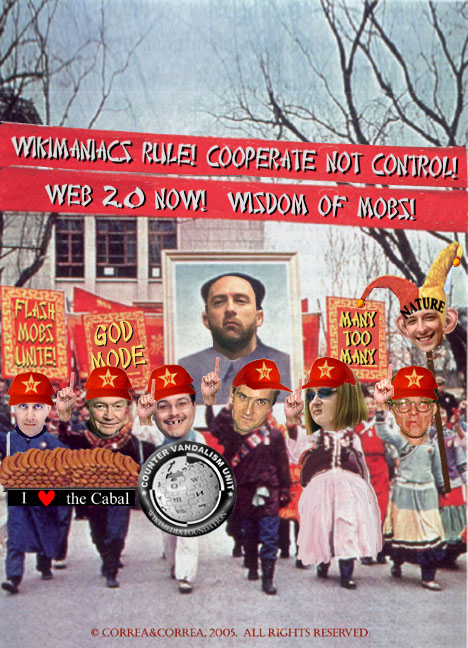

Below is the Answers.com proprietary rights statement, followed by Jimmy Wales' own article from his blog (subtitled "Free Knowledge for Free Minds"...), in which - only a year before the Answers.com deal - he waxes eloquent against proprietary software. Nobody - least of all a Web 2.0 'revolutionary' - dies of contradiction, and whatever works to help cut a deal, goes.
From the Answers.com Legal Agreement pertaining to its technology
8. ANSWERS'S PROPRIETARY RIGHTS
You acknowledge and agree that the Content and Software contain proprietary and confidential information that is protected by applicable Intellectual Property Rights. "Intellectual Property Rights" means any and all rights existing from time to time under patent law, copyright law, trade secret law, trademark law, unfair competition law, and any and all other proprietary rights, and any and all applications, renewals, extensions and restorations thereof, now or hereafter in force and effect worldwide. The Content and all intellectual property rights therein and related thereto are and shall remain the sole and exclusive property of Answers and/or its licensors or suppliers Answers grants you a personal, non-transferable and non-exclusive right and license to view the website pages through a web browsers, and to use the object code of its Software, delivered through a publicly available software installer file, on a single computer or a reasonable number of computers in a single household; provided that you do not (and do not allow any third party to) copy, modify, adapt, translate, create a derivative work from, decompile, reverse engineer, reverse assemble or otherwise attempt to discover any source code, sell, assign, sublicense, grant a security interest in or otherwise transfer any right in the Software. You agree not to modify the Software in any manner or form, or to use modified versions of the Software, including (without limitation) for the purpose of obtaining unauthorized access to the Content. You agree not to access the Content by any means other than through the interface that is provided by Answers for use in accessing the Content. You also agree to not remove, obscure, or alter Answers or any third party's copyright notice, trademarks, or other proprietary rights notices affixed to or contained within or accessed in conjunction with or through the Content.
Answers.com about its software
For ultimate convenience, install 1-Click AnswersTM software, and click on any word in any document on your screen for "Answers at your Fingertips". Our premium content together with our patented technology reduces the overload and frustration of Internet users' trying to locate high-quality reference information.
And here is Che Bimbo Wales ranting against proprietary software a year earlier:
Free Knowledge requires Free Software and Free File Formats
October 21st, 2004



People sometimes ask me why I’m so adamant that Wikipedia must always use free software, even when in some cases it might be the case that proprietary software might be more convenient or better suited for some particular need that we have.
After all, the argument goes, our primary mission is to produce free knowledge, not to promote free software, and whlie we might prefer free software on practical grounds (since it is generally best of breed for webserving applications), we should not be sticklers about it.
I believe this argument is seriously mistaken, and not on merely practical grounds, but on grounds of principle. Free knowledge requires free software. It is a conceptual error to think about our mission as being somehow separate from that.
What is free knowledge? What is a free encyclopedia? The essence is something that anyone who understands free software can immediately grasp. A free encylopedia, or any other free knowledge, can be freely read, without getting permission from anyone. Free knowledge can be freely shared with others. Free knowledge can be adapted to your own needs. And your adapted versions can be freely shared with others.
We can't resist taking a crack at this Bimbo Wales crock. Pure sales prattle - for who of median intelligence on this planet has not yet grasped that when the word 'free' is so freely bandied about (and by an ex-options-trader, to boot) in order to sell or promote a product, it's because the product is useless and worthless? Free knowledge? Of what? Of free falsehoods ministrated by Wikipedian bureaucrats, administrators, their cronies, sock-puppets and drones? Freedom to be disinformed, and to have Wikipedia, Answers.com and Web 2.0 'back up' that disinformation?
But back to Che Bimbo:
We produce a massive website filled with an astounding variety of knowledge. If we were to produce this website using proprietary software, we would place potentially insurmountable obstacles in front of those who would like to take our knowledge and do the same thing that we are doing. If you need to get permission from a proprietary software vendor in order to create your own copy of our works, then you are not really free.
For the case of proprietary file formats, the situation is even worse. It could be argued, though not persuasively I think, that as long as Wikimedia content can be loaded into some existing free software easily enough, then our internal use of proprietary software is not so bad. For proprietary formats, even this seductive fallacy does not apply. If we offer information in a proprietary or patent-encumbered format, then we are not just violating our own commitment to freedom, we are forcing others who want to use our allegedly free knowledge to themselves use proprietary software.
Finally, we should never forget as a community that we are the vanguard of a knowledge revolution that will transform the world. We are the leading edge innovators and leaders of what is becoming a global movement to free knowledge from proprietary constraints. 100 years from now, the idea of a proprietary textbook or encyclopedia will sound as quaint and remote as we now think of the use of leeches in medical science.
No metaphor is spared: 'freedom', 'vanguard' and 'revolution' - in 'knowledge', no less - like a thousand flowers for the great Helmsman; corny scenarios for eager consumption by technohillbillies and pubescent cyberaddicts.
One might wonder what it is that the Great Wales discovered (aside maybe from a temporary formula for not being sued for libel). What is it? A brave new tefflon populist con. How a bankrupt second-hander can don a noble robe of 'objectivism' in order to 'altruistically' loot.
Play pomp and hail the great leaders - it's as good as what was left of the Hegelian method when Mao was done with it, and as useful and usable as the latest dysfunctional plastic gadget made in China: it ranks down there with the humidifiers that set your home on fire, the light switches that melt down a little more every day, the self-igniting LED Christmas lights freely dispensed by foodbanks to the poor, or outsourced user-manuals incoherently translated back into english by robotic babelfish clones... That's Wikipedia, a great, Cuffy Meigs-ian amassment of shredded 'knowledge' that's good for nothing save stupidification. That's the 'gift' to the masses. Talk about leeches... And do note that, by the same token, this is all the masses deserve in the eyes of these leaders. To have ignorance and stupidity peddled to them as knowledge, and to be made ignorant and stupid (aka 'be empowered' to do whatever). Undoubtedly, for this amount of 'inventiveness' no patent is adequate. Only a monopoly on official encyclopedic disinformation will do. And a market of young consumers addicted to this poisonous pablum. So, just for laughs, a bit more Wales before shipping him off with his made-in-China Guevarist bonnet:
Through our work, every single person on the planet will have easy low cost access to free knowledge to empower them to do whatever it is that they want to do. And my point here is that this is not some idle fantasy, but something that we are already accomplishing. We have become one of the largest websites in the world using a model of love and co-operation that is still almost completely unknown to the wider world. But we are becoming known, and we will be known, for both our principles and achievements — because it is the principles that make the achievements possible.
Toward that end, it should be a strong point of pride to us that the Wikimedia Foundation always uses free software on all computers that we own, and that we always put forward our best effort to ensure that our free knowledge really _is_ free, in that people are not forced to use proprietary software in order to read, modify, and redistribute it as they see fit.
Ellsworth Toohey couldn't have said it better. It really was only a matter of finding the lever, wasn't it, Jimbo? 'Saving the planet' is a veritable mania with these types - after all, since they have zilch to offer, they need to market the eternal sausage. One might wonder whether they really believe that their sausage-making contributions are so grandiose as to deserve world acclaim, no less. But their sausage does not even look better. While they rail against proprietorship in order to garner the easy populist vote, and demand that scientists and inventors should voluntarily abdicate their hard-earned proprietary rights - they do not demand free access to the means of creation and production, nor do they provide any. They want capitalism to remain, but to only work for a few. So, they practice ('freely', so to speak...) their own private exercise of those very same proprietary rights. Hence Wales' original company Bomis.com, a purveyor of porn and advertising. Hence, Answers.com. Hence etcetera. After all, one doesn't hear Murdoch calling for expropriation of his own monopoly, does one? So why should Che Bimbo do so? What's mine is mine and gimme your toothpaste while you're at it.
Next: Nature to the rescue of Wikipedia & the future of (pseudo)science
Previous: Wikipedia: a 9/11 of information